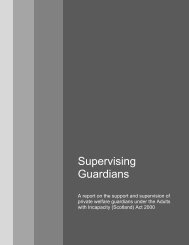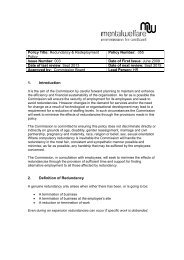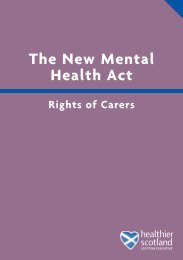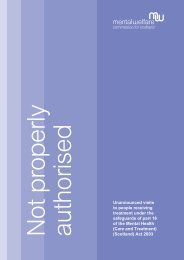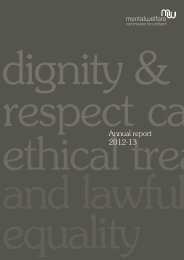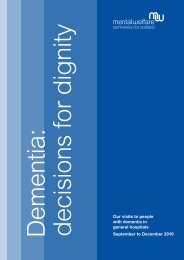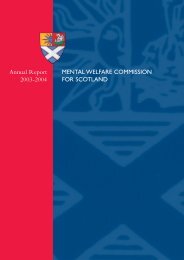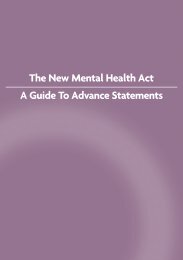A Guide to the Role of the Mental Health Officer - Mental Welfare ...
A Guide to the Role of the Mental Health Officer - Mental Welfare ...
A Guide to the Role of the Mental Health Officer - Mental Welfare ...
- No tags were found...
You also want an ePaper? Increase the reach of your titles
YUMPU automatically turns print PDFs into web optimized ePapers that Google loves.
The New <strong>Mental</strong><strong>Health</strong> ActA guide <strong>to</strong> <strong>the</strong> role <strong>of</strong> <strong>the</strong>mental health <strong>of</strong>ficer
The New <strong>Mental</strong><strong>Health</strong> ActA guide <strong>to</strong> <strong>the</strong> role <strong>of</strong> <strong>the</strong>mental health <strong>of</strong>ficer
THE NEW MENTAL HEALTH ACTA guide <strong>to</strong> <strong>the</strong> role <strong>of</strong><strong>the</strong> mental health <strong>of</strong>ficerIn March 2003 <strong>the</strong> Scottish Parliament passed a new law, <strong>the</strong> <strong>Mental</strong> <strong>Health</strong>(Care and Treatment) (Scotland) Act 2003. It came in<strong>to</strong> effect in Oc<strong>to</strong>ber2005. It sets out how you can be treated if you have a mental disorder, andsays what you rights are.This guide is one <strong>of</strong> a series <strong>of</strong> guides about <strong>the</strong> new Act, and it explains <strong>the</strong>role <strong>of</strong> <strong>the</strong> mental health <strong>of</strong>ficer in relation <strong>to</strong> <strong>the</strong> Act. More detailedinformation on your local mental health <strong>of</strong>ficer service can be obtainedfrom <strong>the</strong> local authority where you live. Your local authority is listed in <strong>the</strong>telephone direc<strong>to</strong>ry under council services.The Act says• When you can be given treatment against your will• When you can be taken in<strong>to</strong> hospital against your will• What your rights are• What safeguards <strong>the</strong>re are <strong>to</strong> make sure your rights are protectedThis guide is written for people who use mental health services, but it maybe useful <strong>to</strong> o<strong>the</strong>rs including carers and independent advocates.DisclaimerWhile we have done our best <strong>to</strong> see that <strong>the</strong> information contained inthis guide was accurate and up <strong>to</strong> date when it was published we cannotguarantee this. If you have any questions about how <strong>the</strong> informationmight apply <strong>to</strong> you, you should discuss your concerns with a solici<strong>to</strong>r,your independent advocate or o<strong>the</strong>r appropriate adviser.iii
Contents1 Guiding principles2 Some terms used in this guide3 What is a mental health <strong>of</strong>ficer?4 What does <strong>the</strong> mental health <strong>of</strong>ficer do?(a) Emergency and short-term orders(b) Compulsory treatment orders(c) Orders related <strong>to</strong> criminal proceedings/<strong>of</strong>fence5 When will <strong>the</strong> mental health <strong>of</strong>ficer prepare aSocial Circumstances Report (SCR)?6 Can I request a different mental health <strong>of</strong>ficer?7 Fur<strong>the</strong>r information contacts8 Acknowledgements9 O<strong>the</strong>r guides in this seriesv
1 Guiding principlesThe main aim <strong>of</strong> <strong>the</strong> principles is <strong>to</strong> ensure that you are treatedwith respect.Anyone who is carrying out duties, or giving you treatment, under <strong>the</strong> Act,e.g. doc<strong>to</strong>rs, nurses and social workers, has <strong>to</strong> follow <strong>the</strong> principles se<strong>to</strong>ut in <strong>the</strong> Act. They must take account <strong>of</strong>:• your past and present wishes about your care and treatment, givingyou information and helping you as much as possible <strong>to</strong> participate indecisions about this• <strong>the</strong> views <strong>of</strong> your named person, carers, guardian or welfare at<strong>to</strong>rney,if you have <strong>the</strong>m• <strong>the</strong> range <strong>of</strong> options available for your care and treatment• what will ensure <strong>the</strong> maximum benefit for you• making sure that you are not treated any less favourably because youare being treated under <strong>the</strong> Act• your individual abilities and background, and o<strong>the</strong>r fac<strong>to</strong>rs such asyour age, gender, sexual orientation, religion, racial origin ormembership <strong>of</strong> any ethnic group.Any restrictions on your freedom should be <strong>the</strong> minimum necessary in<strong>the</strong> circumstances.Where it is reasonable and practical, your carers’ needs should be takenin<strong>to</strong> account and your carers should receive information that might help<strong>the</strong>m <strong>to</strong> care for you.The services that you receive should be appropriate for your needs.Where you s<strong>to</strong>p being subject <strong>to</strong> compulsory powers under <strong>the</strong> Act youshould continue <strong>to</strong> receive care and treatment for as long as is necessary.Where you are a child, under <strong>the</strong> age <strong>of</strong> 18, people carrying out duties under<strong>the</strong> Act must try <strong>to</strong> ensure that <strong>the</strong>y do what is best for your welfare.1
2 Some terms used in this guideThe Act: The <strong>Mental</strong> <strong>Health</strong> (Care and Treatment) (Scotland) Act 2003.Assessment Order: an order made by <strong>the</strong> court which authorises hospitaldetention for up <strong>to</strong> 28 days so that <strong>the</strong> person’s mental condition may beassessed.Compulsion Order: an order made by <strong>the</strong> court which authorisescompulsory measures (ei<strong>the</strong>r hospital or community based) for a period<strong>of</strong> 6 months, if not o<strong>the</strong>rwise renewed.Compulsory Treatment Order (CTO): this is an order which is granted by<strong>the</strong> Tribunal. It can include a number <strong>of</strong> different requirements includingdetention in hospital, compulsory treatment and participating in activitiesin <strong>the</strong> community. It will initially be made for 6 months and can <strong>the</strong>n berenewed for a fur<strong>the</strong>r 6 months, <strong>the</strong>n for periods <strong>of</strong> 12 months, orrevoked at any stage in your recovery.Emergency Detention Certificate: this type <strong>of</strong> power authorises detentionin hospital for no more than 3 days.Extension Certificate: under <strong>the</strong> Act an approved medical practitionermay grant a certificate extending a period <strong>of</strong> short-term detention bythree days <strong>to</strong> allow for <strong>the</strong> preparation <strong>of</strong> an application for a compulsorytreatment order.Hospital Direction: an order made by <strong>the</strong> court in addition <strong>to</strong> sentence<strong>of</strong> imprisonment. It allows <strong>the</strong> person <strong>to</strong> be detained in hospital fortreatment <strong>of</strong> <strong>the</strong>ir mental disorder and <strong>the</strong>n transferred <strong>to</strong> prison <strong>to</strong>complete <strong>the</strong>ir sentence once hospital treatment is no longer required.Independent Advocate: under <strong>the</strong> Act anyone with a mental disorder has<strong>the</strong> right <strong>to</strong> access an independent advocate. An independent advocate isable <strong>to</strong> give support and help <strong>to</strong> enable a person <strong>to</strong> express <strong>the</strong>ir ownviews about <strong>the</strong>ir care and treatment.2
Interim Compulsion Order: an order made by <strong>the</strong> court which authoriseshospital detention for 12 weeks (but can be renewed regularly for up <strong>to</strong>one year) so that <strong>the</strong> court can ga<strong>the</strong>r fur<strong>the</strong>r specific evidence on <strong>the</strong>person’s mental condition.Interim Compulsory Treatment Order: an order granted by <strong>the</strong> Tribunalwhich authorises compulsory measures for a period <strong>of</strong> up <strong>to</strong> 28 days. TheTribunal can make more than one interim CTO as long as <strong>the</strong> <strong>to</strong>tal time isnot more than 56 days.<strong>Mental</strong> Disorder: this is a term used in <strong>the</strong> Act which covers mentalillness (including dementia), a learning disability or a personality disorder.<strong>Mental</strong> <strong>Health</strong> Tribunal: <strong>the</strong> <strong>Mental</strong> <strong>Health</strong> Tribunal for Scotland was setup as part <strong>of</strong> <strong>the</strong> measures <strong>of</strong> <strong>the</strong> Act <strong>to</strong> make decisions about <strong>the</strong>compulsory care and treatment <strong>of</strong> people with mental disorder.<strong>Mental</strong> <strong>Welfare</strong> Commission: <strong>the</strong> <strong>Mental</strong> <strong>Welfare</strong> Commission is anindependent organisation. Its role is <strong>to</strong> safeguard <strong>the</strong> welfare <strong>of</strong> peoplewho are vulnerable through mental disorder.Named Person: this is someone who will look after <strong>the</strong> person’s interestsif he or she has <strong>to</strong> be treated under <strong>the</strong> Act.Place <strong>of</strong> Safety: this is a place where someone might be taken in certaincircumstances if <strong>the</strong>y need <strong>to</strong> be assessed and arrangements made for<strong>the</strong>ir care. It might be a hospital, care home, or o<strong>the</strong>r suitable place. As alast resort, if no o<strong>the</strong>r places are available, it might be a police station.Responsible Medical <strong>Officer</strong> (RMO): this is <strong>the</strong> medical practitioner,usually a consultant psychiatrist, who is responsible for <strong>the</strong> person’s careand treatment.Short-term Detention Certificate: this power authorises detention inhospital and complusory treatment for up <strong>to</strong> 28 days.3
Social Circumstances Report (SCR): is a report which <strong>the</strong> MHO must preparewithin 21 days <strong>of</strong> anyone being made subject <strong>to</strong> a relevant certificate,order or direction under <strong>the</strong> Act. The SCR contains information ga<strong>the</strong>redby <strong>the</strong> MHO on your past and present circumstances.Transfer for Treatment Direction: an order made by <strong>the</strong> ScottishMinisters <strong>to</strong> allow transfer <strong>of</strong> a prisoner <strong>to</strong> hospital for treatment <strong>of</strong> amental disorder.Treatment Order: an order made by <strong>the</strong> court which authorises hospitaldetention for treatment <strong>of</strong> a person’s mental disorder.3 What is a mental health <strong>of</strong>ficer?An MHO is a specially trained social worker who has <strong>the</strong> training, education,experience and skills <strong>to</strong> work with people with a mental disorder. MHOswork for <strong>the</strong> local authorities who have legal duties under <strong>the</strong> Act.4 What does <strong>the</strong> mental health <strong>of</strong>ficer do?When you are required <strong>to</strong> receive care and/or treatment under <strong>the</strong> Act <strong>the</strong>local authority must make sure that an MHO is appointed <strong>to</strong> work with you.You might be being treated under any <strong>of</strong> <strong>the</strong> following orders:• a short-term detention certificate• an interim CTO• a CTO• an assessment order• a treatment order• an interim compulsion order• a compulsion order• a hospital direction• a transfer for treatment direction.4
In <strong>the</strong>se cases <strong>the</strong> MHO will:• interview you• advise you <strong>of</strong> your rights, including your right <strong>to</strong> independent advocacy,legal representation and your right <strong>to</strong> have a named person <strong>to</strong> lookafter your interests.MHO’s are also responsible for:• providing consent for you <strong>to</strong> be assessed or treated in hospital on anemergency or short-term detention certificate• applying for a CTO• letting <strong>the</strong> <strong>Mental</strong> <strong>Welfare</strong> Commission and your named person knowif you have been detained in hospital or when an application is beingmade for you <strong>to</strong> be placed on a CTO.(a) Emergency and short-term ordersThere are different types <strong>of</strong> emergency and short-term orders that allowsomeone <strong>to</strong> be assessed or treated under <strong>the</strong> Act, depending on <strong>the</strong>irparticular circumstances. A separate guide provides information onemergency and short-term orders (see page 12).The role <strong>of</strong> <strong>the</strong> MHO in <strong>the</strong>se orders is explained below:(i)If you appear <strong>to</strong> have a mental disorder and you are living in <strong>the</strong>community and someone expresses concerns about you, <strong>the</strong>n yourlocal authority has a duty <strong>to</strong> look in<strong>to</strong> your circumstances. If <strong>the</strong>re is aproblem getting <strong>to</strong> see you, or have a doc<strong>to</strong>r examine you, <strong>the</strong>n <strong>the</strong>MHO can apply for warrants <strong>to</strong> get legal access <strong>to</strong> your home and cantake steps <strong>to</strong> make sure that you are seen by a doc<strong>to</strong>r. They can alsoapply for a court order that would allow you <strong>to</strong> be taken <strong>to</strong> a ‘place <strong>of</strong>safety’ for up <strong>to</strong> 7 days.5
(ii) If you become unwell as a result <strong>of</strong> your mental disorder and needemergency care and treatment, a doc<strong>to</strong>r may grant an emergencydetention certificate. This will allow you <strong>to</strong> be kept in hospital for up<strong>to</strong> 72 hours. Before <strong>the</strong> doc<strong>to</strong>r does this he or she must discuss thiswith an MHO and get his/her agreement, unless this is not possible.If possible, <strong>the</strong> MHO will interview you and will discuss your situationwith <strong>the</strong> doc<strong>to</strong>r. The MHO will <strong>the</strong>n decide whe<strong>the</strong>r or not anemergency detention certificate is needed.(iii) The Act says that before granting a short-term detention certificate<strong>the</strong> doc<strong>to</strong>r must consult an MHO and get his/her agreement, o<strong>the</strong>rwiseyour short-term detention cannot proceed. Before deciding whe<strong>the</strong>r<strong>to</strong> agree <strong>to</strong> <strong>the</strong> short-term detention certificate, <strong>the</strong> MHO shouldmeet with you, unless <strong>the</strong>re is good reason why <strong>the</strong>y cannot do this.When <strong>the</strong> MHO sees you he/she will:• make an assessment <strong>of</strong> your current position and future needs• ask if you have a named person, and if not explain <strong>the</strong> role andassist you <strong>to</strong> appoint one• inform you <strong>of</strong> <strong>the</strong> availability <strong>of</strong> independent advocacy services,and take steps <strong>to</strong> make sure you have <strong>the</strong> opportunity <strong>to</strong> accessthose services. A separate guide provides information onindependent advocacy (see page 12)• inform you <strong>of</strong> your right <strong>to</strong> a lawyer and advise on how <strong>to</strong> obtain one.If <strong>the</strong> MHO is not able <strong>to</strong> interview you or find out who your namedperson is, <strong>the</strong>n he/she will tell <strong>the</strong> doc<strong>to</strong>r dealing with your case tha<strong>the</strong>/she has not been able <strong>to</strong> do this. A separate guide provides informationabout <strong>the</strong> named person (see page 12).The MHO must be consulted before <strong>the</strong> doc<strong>to</strong>r grants an extension <strong>to</strong> <strong>the</strong>short term detention certificate, except where it is not possible for thisdiscussion <strong>to</strong> take place.6
(b) Compulsory treatment ordersIf it is felt that you need longer-term care and treatment under <strong>the</strong> Act,<strong>the</strong>n an application might be made by <strong>the</strong> MHO <strong>to</strong> <strong>the</strong> Tribunal for you <strong>to</strong>be placed under a CTO. A separate guide provides information on CTOs(see page 12).The MHO who is making <strong>the</strong> application should identify your namedperson and explain what rights you have, e.g. your right <strong>to</strong> challenge <strong>the</strong>application and have your views heard by <strong>the</strong> Tribunal. The MHO shouldalso give you information about independent advocacy services and helpyou contact this service if you need help <strong>to</strong> do this. They should alsoensure that you are aware <strong>of</strong> your right <strong>to</strong> legal representation and advisehow <strong>to</strong> obtain a lawyer.If you are subject <strong>to</strong> a CTO your MHO will work with you and his or heropinion will be sought when <strong>the</strong> order is reviewed or varied.If you have any communication difficulties <strong>the</strong> MHO must make sure youget <strong>the</strong> support you need.(c) Orders related <strong>to</strong> criminal proceedings/<strong>of</strong>fenceIf you are involved in criminal proceedings <strong>the</strong> MHO might be called <strong>to</strong>advise <strong>the</strong> court on your case.If you have been remanded on a pre-trial Assessment or Treatment Orderan MHO will be appointed <strong>to</strong> work with you. Your MHO must produce anSCR within 21 days and will prepare an MHO report for <strong>the</strong> court.If you have been remanded on a post-trial Assessment, Treatment or interimCompulsion Order an MHO will be appointed <strong>to</strong> work with you. The MHOmust produce an SCR within 21 days and prepare an MHO report for <strong>the</strong>court (see section 5 below).7
If you are subject <strong>to</strong> a Compulsion Order or a Restriction Order an MHOwill be appointed <strong>to</strong> work with you and his or her opinion will be soughtwhen <strong>the</strong> Compulsion Order is reviewed.If <strong>the</strong> court has decided that you should be sent <strong>to</strong> hospital for treatmentand issues a Hospital Direction you will have an MHO appointed <strong>to</strong> workwith you for <strong>the</strong> period <strong>of</strong> time you are subject <strong>to</strong> this order. Your MHOmust produce an SCR within 21 days and <strong>the</strong> MHO’s opinion will be soughtwhen <strong>the</strong> Direction is being reviewed.If you are subject <strong>to</strong> a Transfer Direction that allows for you <strong>to</strong> be moved<strong>to</strong> a hospital, an MHO will be appointed <strong>to</strong> work with you for <strong>the</strong> duration<strong>of</strong> <strong>the</strong> Direction. Your MHO must produce an SCR within 21 days and <strong>the</strong>MHO’s opinion will be sought when <strong>the</strong> Direction is being reviewed.5 When will <strong>the</strong> mental health <strong>of</strong>ficer prepare a SocialCircumstances Report (SCR)?The SCR contains information ga<strong>the</strong>red by <strong>the</strong> MHO about your past andpresent circumstances. The MHO must prepare an SCR if you are beinggiven care or treatment under any <strong>of</strong> <strong>the</strong> following orders:• a short-term detention certificate• an interim CTO• a CTO• an assessment order• a treatment order• an interim compulsion order• a compulsion order• a hospital direction• a transfer for treatment direction.The SCR has <strong>to</strong> be prepared within 21 days <strong>of</strong> <strong>the</strong> order being put in place.8
The MHO will send a copy <strong>of</strong> your SCR <strong>to</strong> <strong>the</strong> <strong>Mental</strong> <strong>Welfare</strong> Commissionand your RMO. Your RMO may use <strong>the</strong> report <strong>to</strong> help him or her <strong>to</strong> make adecision about your care and treatment including any support needs <strong>of</strong>carers.The <strong>Mental</strong> <strong>Welfare</strong> Commission may use <strong>the</strong> report <strong>to</strong> help ensure thatyour care and treatment is delivered in a way that provides you withmaximum benefit and respects your rights. If <strong>the</strong> Commission has concernsabout your circumstances it may make fur<strong>the</strong>r enquiries.Usually <strong>the</strong> MHO will give you a copy <strong>of</strong> <strong>the</strong> report.Your MHO does not need <strong>to</strong> prepare an SCR if he or she thinks it would servelittle or no practical purpose. This may be because an SCR was recentlycompleted in relation <strong>to</strong> ano<strong>the</strong>r aspect <strong>of</strong> your care and treatment. TheMHO will let <strong>the</strong> <strong>Mental</strong> <strong>Welfare</strong> Commission and your RMO know why<strong>the</strong>y have not prepared an SCR.6 Can I ask for a different mental health <strong>of</strong>ficer?Yes. If you find that you can’t work with <strong>the</strong> MHO that has been appointed,you can discuss this with <strong>the</strong>m or you can contact your local authority andask <strong>to</strong> speak <strong>to</strong> <strong>the</strong> manager <strong>of</strong> <strong>the</strong>ir MHO service and explain your difficulties.In most situations <strong>the</strong> manager will help <strong>to</strong> resolve <strong>the</strong> situation or allocateyou ano<strong>the</strong>r MHO. If you are still unhappy, <strong>the</strong>n you can consider making acomplaint using <strong>the</strong> local authority complaints procedure.9
7 Fur<strong>the</strong>r information contactsBipolar Fellowship ScotlandStudio 1016, Abbeymill Business Centre, Seedhill Road, PAISLEY PA1 1TJtelephone: 0141 560 2050website: www.bipolarscotland.org.ukDepression Alliance Scotland3 Grosvenor Gardens, EDINBURGH EH12 5JUtelephone: 0131 467 7701website: www.depressionalliance.org<strong>Mental</strong> <strong>Health</strong> Tribunal for Scotland1st Floor, Bothwell House, Hamil<strong>to</strong>n Business Park, Caird Park,HAMILTON ML3 0QAtelephone: 01698 390 000service user & carer freephone: 0800 345 70 60website: www.mhtscot.gov.uk<strong>Mental</strong> <strong>Welfare</strong> Commission for ScotlandFloor K, Argyle House, 3 Lady Lawson Street, EDINBURGH EH3 9SHtelephone: 0131 222 6111service user & carer freephone: 0800 389 6809website: www.mwcscot.org.ukNational Schizophrenia Fellowship (Scotland)Claremont House, 130 East Claremont Street, EDINBURGH EH7 4LBtelephone: 0131 557 8969website: www.nsfscot.org.ukThe Office <strong>of</strong> <strong>the</strong> Public GuardianHadrian House, Callendar Business Park, Callendar Road, FALKIRK FK1 1XRtelephone: 01324 678 300website: www.publicguardian-scotland.gov.uk10
People First (Scotland)77-79 Easter Road, EDINBURGH EH7 5PWtelephone: 0131 478 7707website: www.peoplefirstscotland.comScottish Association for <strong>Mental</strong> <strong>Health</strong> (SAMH)Cumbrae House, 15 Carl<strong>to</strong>n Court, GLASGOW G5 9JPtelephone: 0141 568 7000website: www.samh.org.ukScottish Commission for <strong>the</strong> Regulation <strong>of</strong> Care11 Riverside Drive, DUNDEE DD1 4NYtelephone: 0845 60 30 890website: www.carecommission.comScottish Consortium for Learning Disability (SCLD)The Adelphi Centre, Room 16, 12 Commercial Road, GLASGOW G5 0PQtelephone: 0141 418 5420website: www.scld.org.ukScottish Independent Advocacy Alliance138 Slateford Road, EDINBURGH EH14 1LRtelephone: 0131 455 8183website: www.siaa.org.ukScottish Public Service Ombudsman4 Melville Street, EDINBURGH EH3 7NStelephone: 0870 011 5378Website: www.scottishombudsman.org.ukYour local authority is listed in <strong>the</strong> telephone direc<strong>to</strong>ry under council services.11
8 AcknowledgementsThis guide was produced in collaboration with Scottish Association for<strong>Mental</strong> <strong>Health</strong>, National Schizophrenia Fellowship Scotland, <strong>the</strong> ScottishIndependent Advocacy Alliance, <strong>the</strong> <strong>Mental</strong> <strong>Welfare</strong> Commission forScotland, <strong>the</strong> State Hospital at Carstairs, and <strong>the</strong> Scottish Executive.9 O<strong>the</strong>r guides in this series• The new <strong>Mental</strong> <strong>Health</strong> Act – A guide <strong>to</strong> advance statements• The new <strong>Mental</strong> <strong>Health</strong> Act – A guide <strong>to</strong> compulsory treatment orders• The new <strong>Mental</strong> <strong>Health</strong> Act – A guide <strong>to</strong> consent <strong>to</strong> treatment• The new <strong>Mental</strong> <strong>Health</strong> Act – An easy read guide• The new <strong>Mental</strong> <strong>Health</strong> Act – A guide <strong>to</strong> emergency and short-termpowers• The new <strong>Mental</strong> <strong>Health</strong> Act – The role <strong>of</strong> <strong>the</strong> <strong>Mental</strong> <strong>Welfare</strong> Commission• The new <strong>Mental</strong> <strong>Health</strong> Act – A guide <strong>to</strong> named persons• The new <strong>Mental</strong> <strong>Health</strong> Act – A guide <strong>to</strong> <strong>the</strong> roles and duties <strong>of</strong> NHSBoards and local authorities• The new <strong>Mental</strong> <strong>Health</strong> Act – A guide for people involved in criminalproceedings• The new <strong>Mental</strong> <strong>Health</strong> Act – Putting Principles in<strong>to</strong> Practice• The new <strong>Mental</strong> <strong>Health</strong> Act – What’s it all about? A short introduction• The new <strong>Mental</strong> <strong>Health</strong> Act – A guide <strong>to</strong> independent advocacy• The new <strong>Mental</strong> <strong>Health</strong> Act – An introduction <strong>to</strong> <strong>the</strong> <strong>Mental</strong> <strong>Health</strong>Tribunal for Scotland• The new <strong>Mental</strong> <strong>Health</strong> Act – A guide <strong>to</strong> <strong>the</strong> appeals process• The new <strong>Mental</strong> <strong>Health</strong> Act – Rights <strong>of</strong> carers12
Fur<strong>the</strong>r copies <strong>of</strong> this document are available, on request, in audio and large printformats and in community languages, please contact:Telephone 0131 556 8400.© Crown copyright 2006This document is also available on <strong>the</strong> Scottish Executive website:www.scotland.gov.ukAstron B45244 9/06Fur<strong>the</strong>r copies are available fromBlackwell’s Bookshop53 South Bridge, Edinburgh EH1 1YSISBN 0-7559-4970-6Telephone orders and enquiries0131 622 8283 or 0131 622 8258Fax orders 0131 557 8149Email orders business.edinburgh@blackwell.co.uk9 780755 949700




